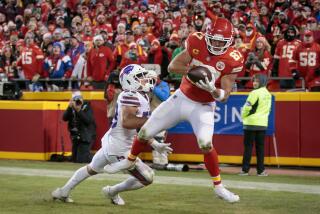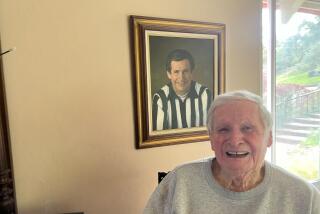Picking Off a Theory
As a principal cause of victory and defeat, turnovers are widely and wildly overrated. If the San Francisco 49ers finish ahead of Baltimore today in favorable turnover ratio, as well as in total points scored, youŌĆÖll never hear me say that one led to the other.
Look what turnovers did for San Francisco last Sunday when Brett Favre threw interceptions at the Green Bay 20 twice -- in the first quarter: The 49ers got nothing either time, and eventually lost, 20-10.
Turnovers donŌĆÖt win or lose football games. Coaches and players do. The relevant facts after any interception or fumble are what prompted it and what the teams do next.
In the Green Bay instance, FavreŌĆÖs broken thumb led to the interceptions -- meaning he should be cleared of personal blame -- and lax coaching led to the 49ersŌĆÖ failure to score.
In scoring position, when offensive linemen are flagged repeatedly for jumping offside as the 49ers were last week, thatŌĆÖs lack of discipline, and thatŌĆÖs a coaching problem.
And when an offensive team keeps running the ball unsuccessfully into stacked running-play defenses, as the 49ers do too often, considering the excellence of their pass offense, thatŌĆÖs also coachesŌĆÖ error.
Turnovers are just something they blather about to insinuate that itŌĆÖs never the coach who errs.
In the fourth quarter Monday night, the Tampa Bay Buccaneers, on their way to a 19-13 victory, didnŌĆÖt miss a beat after the New York Giants had hit them with a major turnover, a fourth-quarter pass for an interception that young New York cornerback Frank Walker ran in for a 56-yard touchdown.
The Buccaneers simply shrugged off the rookieŌĆÖs startling interception, and, led by their quarterback Brad Johnson, had their way again thereafter with the determined but undisciplined Giants, who were caught for three critical face-mask fouls and half a dozen other mostly stupid infractions of old rules.
Although more than seven minutes remained after the Walker turnover, there was no shift in momentum as both of the defensive teams staggered sometimes, but they never collapsed.
Turnovers are less important than announcers keep saying. You donŌĆÖt root for your side to fumble, but you donŌĆÖt give it much worry time.
*
Four Bulger Picks
The St. Louis Rams, taking sole possession of first in the NFC West, turned the ball over five times last Sunday -- on quarterback Marc BulgerŌĆÖs four interceptions and a fumble -- and won anyway, 30-27, at Arizona.
That was reminiscent of the six turnovers, three interceptions and three fumbles that Joe Montana survived to beat Dallas in the 1980s game that began San FranciscoŌĆÖs long run to an unprecedented five Super Bowl championships.
Against Arizona, Bulger, as all good passers must, simply ignored the reality that, to a passing team, interceptions are part of football.
Doggedly, beautifully, he kept throwing the ball downfield to Isaac Bruce, one of the smoothest and slickest of NFL receivers, and to Torry Holt, another great one.
On most other NFL teams, the coaches magnify turnovers and, when they lose, use those plays -- interceptions and fumbles -- as excuses for losing. By turnovers, they mean, ŌĆ£I did everything right, but my players screwed up.ŌĆØ
*
Analyzing an Interception
The New England Patriots, who play at Indianapolis today, won at Houston last Sunday, 23-20, after hometown quarterback Tony Banks threw an interception in overtime. Deducing that BanksŌĆÖ turnover was the passerŌĆÖs fault, however, is simplistic and frequently wrong.
To accurately analyze any interception, it must be known:
* Did the intended receiver make a wrong move or was he otherwise impeded, legally or illegally, by opponents?
* Was the receiver insufficiently instructed?
* Did the coach who called that play anticipate the defense his players got?
* Did the offensive line coach have all his players ready and making the right blocks for the play called?
* Did blocking backs or others miss any assignments?
* Was the passer taking a calculated chance, as passers sometimes must? In the Houston instance, a penalty had shoved the Texans backward on the overtime play before Banks, after twice throwing touchdowns, threw the interception. In overtime against a team with a feared field-goal kicker, Banks had to try to work the ball out. ThatŌĆÖs not to say that thatŌĆÖs what happened. But in the NFL, it does happen.
Thus to merely count turnovers -- and point a finger at those seemingly responsible -- is always premature, nearly always irresponsible, and usually incorrect.
*
Coordination Problem
The Indianapolis Colts (9-2) have the weapons to turn back New England (9-2) today in a collision of AFC division leaders. Theoretically, they can threaten the Patriot defense on every down with quarterback Peyton Manning and running back Edgerrin James.
The ColtsŌĆÖ problem is that their coaches donŌĆÖt play football that way. Instead of integrating Manning and James in a coordinated assault, Indianapolis attacks for a while with one of them, and then the other.
So against an inferior opponent at Buffalo last week, the Colts fussed around for three quarters as Manning, before almost every play, walked back and forth visiting awkwardly with his teammates, presumably making or faking audible calls.
Then he handed off to James for a simple line buck.
Or, on third and long, he stood back in shotgun formation to throw a pass that Buffalo expected.
As a consequence, the overmatched Bills were still ahead in the fourth quarter when, with a couple of minutes to play, the Colts finally settled down, quit trying to disrupt the Bills, and pulled it out, 17-14.
Of the many things wrong with IndianapolisŌĆÖ offensive strategy, one of the most serious is ManningŌĆÖs absurd retreat into a shotgun position on most third-down plays.
Any defense that can count on a pass -- as it usually does when an offense is in the shotgun -- has an excellent chance to beat the passer.
It doesnŌĆÖt have to worry about a ballcarrier on those plays because itŌĆÖs hard for backs to run from the shotgun, starting six or seven yards behind the line.
Nor do defenses fear ManningŌĆÖs passes on first down, because James so often carries the ball on the ColtsŌĆÖ early-count plays.
Their record, after winning nine times from teams as good as Tennessee, New Orleans and Tampa Bay, tells you how good their offensive players are, not their offensive coaches.
*
ColtsŌĆÖ Postscript
The reason Manning figures over New England quarterback Tom Brady today is that Manning has James to lean on, whereas Brady has nobody.
The PatriotsŌĆÖ ostensible mighty back, Antowain Smith, who was brought in to give them a running game, gained 10 yards in eight carries against Houston.
And although Patriot running back Kevin Faulk added 80 yards, it took him 23 carries. Few teams really fear Faulk, who isnŌĆÖt quite fast enough for a back weighing only 202 pounds.
Thus the New England offense is in the hands of one good man, Brady, who as a big-play passer isnŌĆÖt much better than Manning.
Indianapolis vs. New England is, however, a meeting of great defensive coaches, Tony Dungy of Indianapolis and Bill Belichick of New England, as well as great passers, Manning and Brady, and, in a game like this, thereŌĆÖs no way to predict which of the four will get hot.
*
Bear Lineup OK
The Chicago Bears toppled the Broncos, 19-10, which is a result that makes absolutely no sense except on one level:
The Bears have a lot of great players, more than many of the opponents in their conference as well as all the teams in their division, the NFC North, except Green Bay.
And whoŌĆÖs to say that, man for man, Green Bay is really superior? Critics would take Brett Favre, sure, over either Chicago quarterback, Chris Chandler or Kordell Stewart. And most would go for Green Bay running back Ahman Green over ChicagoŌĆÖs Anthony Thomas, but that comparison is closer.
And at many other positions, itŌĆÖs still closer.
If directed by the people on a good coaching staff, Thomas would be putting up numbers not so far behind GreenŌĆÖs. And Chandler would look more like Manning. For, in Chicago, coaching is the problem. Those who coach the Bears are incredibly unimaginative.
But they do have some wonderful players on both sides of the ball.
And when good players feel theyŌĆÖre being maligned -- as the Bears did when told they were 10 1/2 points the lesser team in Denver -- theyŌĆÖre capable of rising up, sometimes, and proving somebody wrong.
As a team, of course, by comparison with the NFLŌĆÖs 30 best teams, the Bears arenŌĆÖt much, as they showed when stumbling at Detroit, 12-10, and when losing a 49-7 game to a San Francisco team whose players arenŌĆÖt much better than theirs. At Denver, though, Chicago played some winning football.
Another provocative thing is that Chandler was injured. The Denver coaching staff had prepared for Chandler, who canŌĆÖt run, and in the second half got Stewart, who can. That doesnŌĆÖt seem important either, but in a 60-minute game it sometimes is.
More to Read
Go beyond the scoreboard
Get the latest on L.A.'s teams in the daily Sports Report newsletter.
You may occasionally receive promotional content from the Los Angeles Times.










